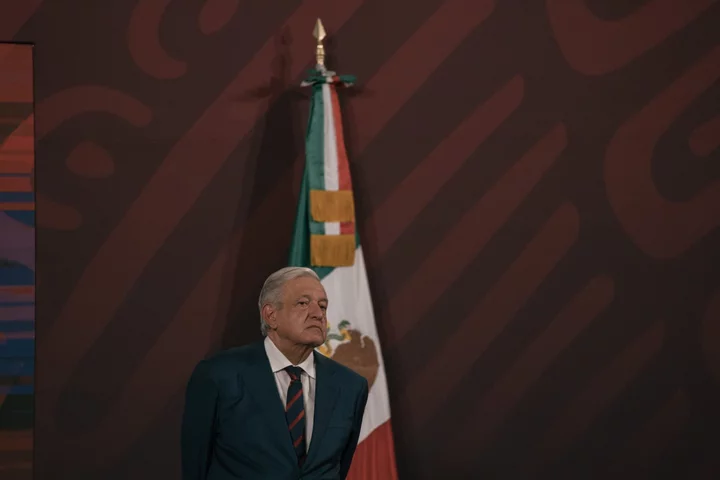Mexican stocks clawed back some of the steep losses sparked by an unexpected change to airports’ concessions agreements as investors eyed strong growth data and a local media report that suggested the changes to airport fees may not be as harsh as feared.
The benchmark stock index rose 0.5%, reversing losses of as much as 1.4%, in a rebound that was also aided by an improving mood in global markets.
The index is still on track for its worst week since June on the back of a decision from President Andres Manuel Lopez Obrador’s administration to change fee agreements with airport operators, which raised worries AMLO was taking a more aggressive stance against business interests as he heads into his final year in office.
While concerns about government intervention could continue to weigh on stocks, they also create a “brilliant investment opportunity,” according to Rodolfo Navarrete, head of analysts at Mexican brokerage Vector.
“There is a very large gap that is increasingly widening between the behavior of the economy and the behavior of the stock market,” Navarrete said. “Stocks will probably continue to fall, and if they continue to fall, I will keep buying.”
Mexican growth outpaced initial forecasts and is seen expanding 3.2% this year, helped by solid domestic consumption, which has been supercharged by record remittances from migrants, as well as growing company investments to move supply chains closer to the US in a trend known as nearshoring.
Rebound
Further supporting gains, journalist Ciro Gomez Leyva said in his news show Friday that, among the changes to airport fees, the administration wants to decrease the passenger fee, known as TUA, by as much as 8%, without stating the source of the information. That fed bets that the impact on airport groups had been overestimated.
Grupo Aeroportuario del Sureste SAB, or Asur, rose more than 4% and Grupo Aeroportuario del Pacifico SAB, or GAP, gained over 2% as they bounced back from Thursday’s losses. Grupo Aeroportuario del Centro Norte SAB pulled back from a drop of more than 9% to trade around 1% lower. Airline Controladora Vuela Compania de Aviacion, or Volaris, surged about 7%.
Investors were confused by the lack of transparency after airport operators said late Wednesday that the national aviation agency “unilaterally and without prior communication” modified the fee structure related to its airports. The move — which the government has yet to confirm or clarify — has raised fears that other regulated industries could see abrupt changes ahead of elections next year, and sparked a widespread plunge in markets on Thursday.
Read More: One Blow After Another Roils Markets During AMLO’s Final Year
Ted Mann, a senior emerging markets analyst at Ariel Investments in New York, said a unilateral move by the government to change airport concessions would risk undermining the country’s ability to attract investment and the buzz about nearshoring.
“An unexpected revision to the rules of the game in airport concessions has the potential to jeopardize foreign investment even more significantly than did other changes in recent years,” Mann said.
AMLO’s administration has had a largely enigmatic approach to the business community, with a surge in foreign investment being punctuated by moves such as seizing a stretch of rail line owned by a billionaire businessman and ordering the cancellation of ongoing projects including an airport and a beer plant.
--With assistance from Srinivasan Sivabalan and Carolina Gonzalez.
(Recasts paragraphs one through seven with stock rebound.)

